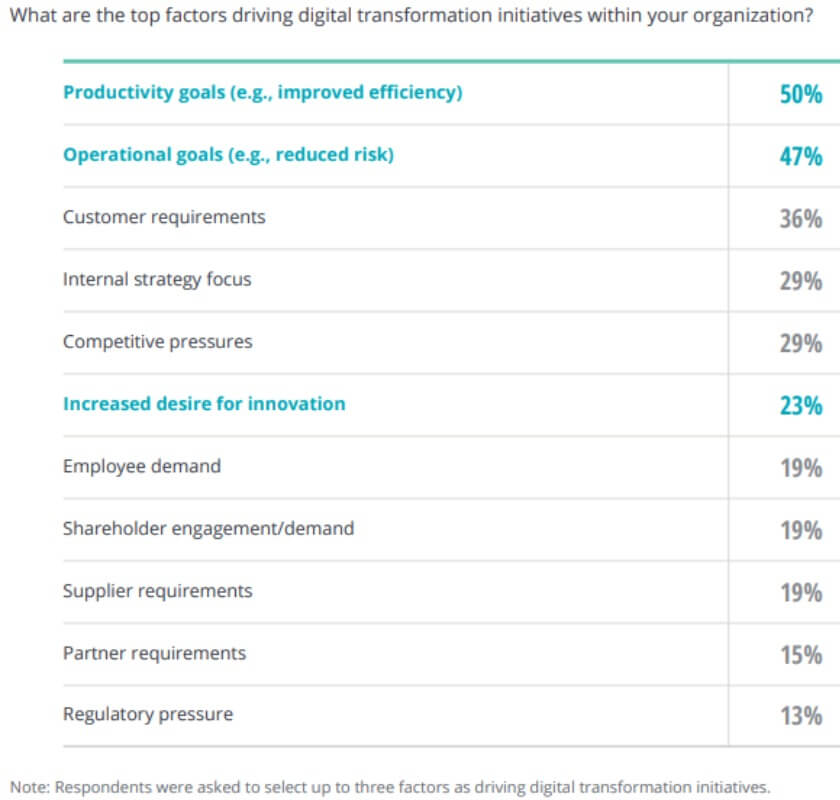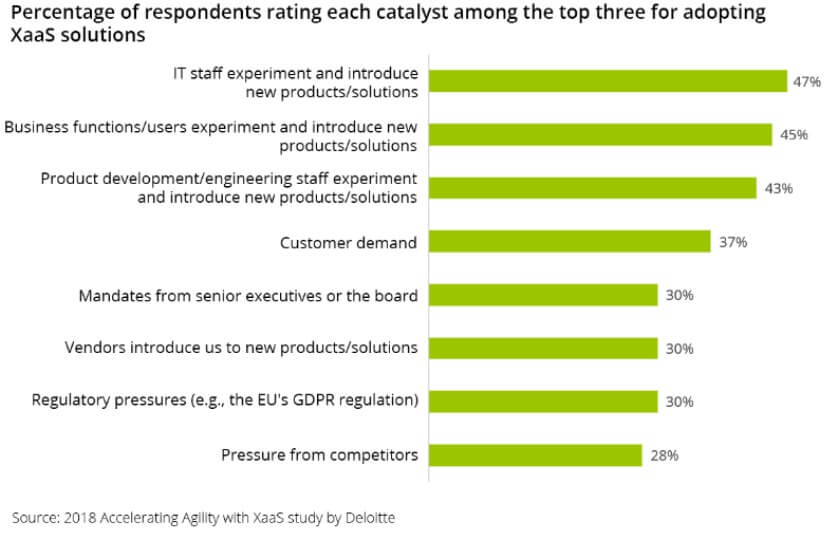As navigating rapid digitalization becomes inevitable for businesses, flexible and agile models such as Everything-as-a-Service or XaaS are no longer an option, but a necessity to stay ahead of the competition in the digital transformation era.
During the advent of the pandemic last year, organizations with well-equipped infrastructure enabled the world of work to quickly move from on-premises to online. These businesses subscribed to relevant digital tools and services that would previously take years to deploy.
However, in the pursuit of digital transformation, a Deloitte study found that 50% of organization plans to prioritize improving current processes. Whereas, only 23% of them are steered towards innovation. Everything as a Service or XaaS, a model that allows individuals and businesses to easily acquire a variety of computing-related services over the internet, is integral in digital transformation.

Over the years, businesses have adapted to effective as-a-Service models to achieve their desired outcomes. Some examples are Software-as-a-Service (SaaS), Infrastructure-as-a-Service (IaaS), or Platform-as-a-Service (PaaS). The internet has enabled the delivery of faster access and more capability with these models. Various aspects of computing are now simply on-demand subscription-based services. These solutions are now part of a broad computing category called XaaS. And this category is powering the digital transformation of businesses as well as the future of work.
What is XaaS?
XaaS comprises utility-style offerings that can be consumed on a per-device, per-month model, depending on an organization’s demands. The operating model looks different for every company. However, it typically involves understanding the business needs and delivering technology services that cater to specific outcomes. That said, the primary goal of XaaS offerings is to increase value for the customer.
Currently, XaaS encompasses different types of as-a-services, dominated by three main areas – SaaS, IaaS, and PaaS. There’s a long list of emerging solutions including, but not limited to:
- Unified Communications as a Service or UCaaS
- Desktop as a Service, or DaaS
- Security as a Service, or SECaaS
- Data as a Service, or DaaS
- Monitoring as a Service, or MaaS
- Artificial Intelligence as a Service, or AIaaS
- Video as a Service, or VaaS
XaaS in digital transformation
Globally, businesses began pursuing digital transformation before the pandemic. On the other side, XaaS revenues were already outperforming traditional product revenues before the global downturn. When COVID-19 hit and remote working became the need-of-the-hour, many businesses realized that their technology infrastructure was not up-to-the-mark. This simply accelerated and amplified the XaaS adoption trend.
Digital transformation is riding on XaaS functions. In a TSIA study, technology companies reported an average growth rate of 32% for their managed services business. This was far more than the average growth rate for their products. With the massive success of subscription-based business models, more organizations are looking to get in on the action. Moreover, they are considering the integration of products and services into a single package (also known as servitization).
Now, companies are seeking the ability to integrate applications and support organizational transformation. Here’s how XaaS can help you achieve your digital transformation goals:
4 ways to boost digital transformation with XaaS
1. Cost-effective and flexible adoption of one or more solutions
Technology companies can achieve significant cost savings by no longer having to build or invest in different software and platforms. They can cut costs by purchasing services from providers on a subscription basis and pay on the go.
From an infrastructure standpoint, they can avoid having to buy expensive server and storage equipment since, with XaaS, they no longer need to pay for physical space to keep it in. Additionally, the XaaS model provides businesses with the flexibility to customize their technology environments to accommodate rapidly changing employee and customer needs.
For instance, a business can utilize a customer service module that enables their marketing and sales teams to track a client’s past interactions with the company. This same module can also be used by the IT team to manage service calls, and by the purchasing team to identify and manage preferred vendors.
2. Accelerating innovation and agility in the IT landscape
Businesswire’s global survey showed that among businesses that have adopted XaaS, 77% have increased customer retention, 75% have introduced more standardization into their products and services, and 80% have introduced more personalization in their marketing communication.
This is because XaaS-enabled companies can quickly access new technologies and scale infrastructure automatically when users need innovative resources. Thus, IT service providers get an opportunity to leverage the cloud, based on market demand rather than technology maturity.
Moreover, since XaaS allows companies to introduce new solutions, whether to personalize a process, choose a new IT vendor, or scale up or down, they become more agile in a digitally demanding environment. In the 2018 Deloitte flexible consumption models study, most respondents suggested that XaaS helped them move towards swift experimentation and IT innovation they would otherwise find too expensive to afford.

Amazon Web Services (AWS) is a great example of an agile cloud computing (XaaS) solution. It provides businesses with virtual servers that can be made operational in seconds. Procuring a virtual private cloud at AWS is on-demand. The company has an expansive self-serve management console that allows businesses to order and configure many cloud-hosted services quickly in any AWS region.
3. Enabling data-based decision-making for small businesses
Small business owners may make critical choices based on intuition and instinct, which is far from ideal in a highly competitive market. XaaS provides businesses with access to data analytics tools at a much lower cost to make informed decisions.
Data-based decision-making can push small businesses to build stronger relationships with existing clients by employing regular feedback mechanisms, review sites, customer satisfaction surveys, chatbots, and social media communications.
For example, on-demand research solutions can allow businesses to track and predict user behavior over a period of time. A XaaS solution can marry research-generated insights with customer experience data points to improve customer engagement based on their online habits or purchase history.
4. Higher levels of cybersecurity
From a massive Twitter cybersecurity breach to the ransomware attack on a healthcare industry leader last year, inadequate planning and poor application designs have exposed many businesses to data-theft threats. In fact, of the 43% of businesses facing cyberattacks, only 14% of them can defend themselves effectively. This problem arises because of legacy systems and complex upgrade paths.
So, XaaS can help businesses ensure rigorous authentication and password protection protocols by leveraging cloud-based apps. This not only helps them better protect themselves but their customers as well.
For example, let’s consider Windows as a Service (WaaS). The new Windows 10 Model of WaaS ensures high security by running monthly security patches and bi-annual feature updates that can be deployed automatically. With controlled cadence, XaaS vendors can promptly resolve potential conflicts for legacy and custom applications.
The road ahead
The adoption of a XaaS model will be one of the key deciding factors on how quickly businesses can achieve their digital transformation goals. Technology leaders and teams who understand and embrace XaaS are well-positioned to succeed in today’s hyper-connected and competitive, global marketplace.
For nearly two decades, Netscribes has been helping technology companies combat such threats of disruption and build a competitive advantage through holistic insights from market intelligence solutions.
To learn how we can support your digital transformation goals, contact us.






